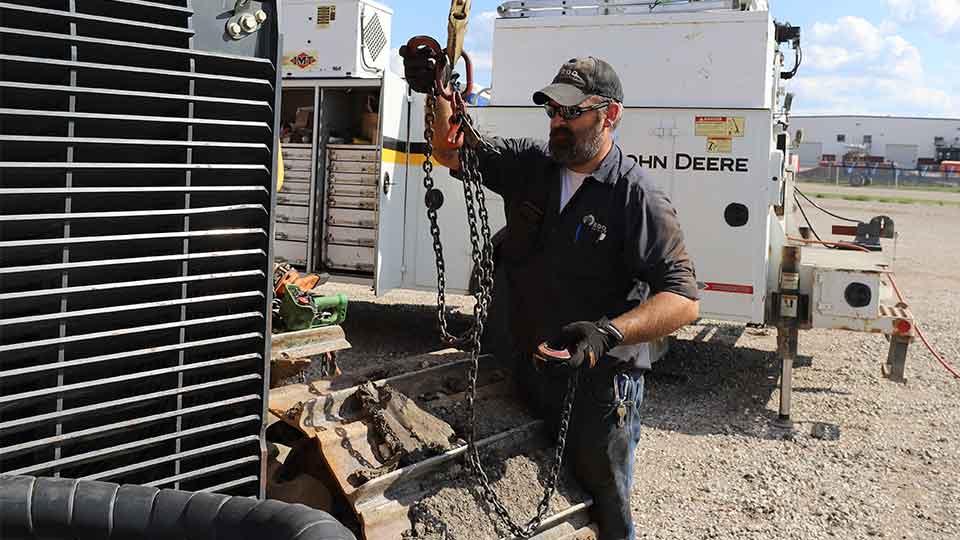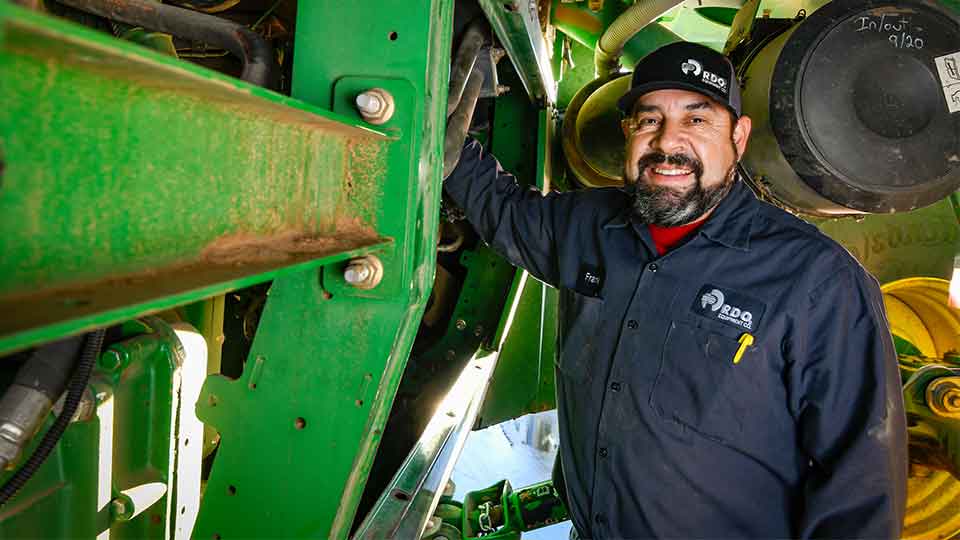
Whether you work on heavy equipment (at a dealership like RDO Equipment Co.) on semi-trucks or other machinery/equipment, you need a good set of tools to do your job at the highest level.
Diesel mechanic tools like wrenches, socket sets, ratchets, screwdrivers and pliers can get expensive.
While there are certain ways to save money on tools, it’s not uncommon for technicians to finance them.
What does this mean?
Is this the right decision for you?
Here at RDO, our more than 1,000 full-time service technicians are required to bring their own set of tools to work. Many of them participate in financing programs when it makes sense for them to do so.
In this article, I’ll explain what it means to finance tools, how this is typically done (and your options) and what the pros and cons of making this decision are.
Tools are a big expense for you. In the diesel trade, you’re often required to supply the necessary tools for your job (excluding specialty tools), that’s the case at RDO as it is in other places.
Honestly, getting a new set of wrenches or sockets is kind of fun. There’s just something about having new tools to work with, you know?
Also, having good-quality tools (without damage, rust or breaks) makes them safer to handle and use.
If you’ve bought tools before, you know (or if you’ve done some research, you’ll see) that they can get expensive.
Add that technicians can wear out and repurchase multiples of certain tools within 12 months, and this expense rises.
This is where tool financing comes into play.
When you finance your tools, you’re able to pay for tools in smaller chunks instead of having to pay for all of them at once. Often, this convenience comes with interest rates tacked onto the payment.
Something to keep in mind: The pay-as-you-go model is becoming more and more common online, where you can pay for things with “X Interest-Free Payments.” This could also be an option for you.

Depending on your situation, there may be multiple options for getting into a pay-as-you-go tool financing program.
The first is to work directly with the tool company. Companies like Snap-On, Matco, Boxo and Cornwell offer technicians credit accounts to help them get tools, allowing them to pay for them at regular cadences throughout the year.
In my world (the heavy equipment industry), this is seen most prominently when tool company representatives come by our store to sell us tools from their trucks.
These reps, who stop by every week or so, offer the full range of hand tools and supplies our technicians use every day. Financing is available if a technician asks for it, up to a certain amount (they’ll only carry you up to a point).
Sign Up: Service Technician Monthly Newsletter
Become a more profitable, successful mechanic with insights and resources sent to your inbox every month.
Another way to receive financing (financing is used loosely in this scenario) is through your employer. Some companies (RDO included) have a tool financing program for their techs. Here’s how this works:
A technician is approved for a line of credit through their employer, call it $2,000. This money is then spent on tools, either all at once or in chunks. Going forward, a set percentage is taken out of the technician’s paycheck — usually around 5 percent of the credit line per month.
With this system, technicians can obtain the necessary tools without paying a lump sum all at once – you can also avoid paying interest in this situation.
In my experience, tool financing can be a good program for many technicians.
This is a good way to acquire tools, especially a lot of them, without having to pay for them immediately.
Technicians who are paid every two weeks, for example, may want to take advantage of tool financing.
Beyond having access to additional tools immediately, this also gives you some budgeting control. When you’re on a payment plan, you can work these costs into your monthly budget, which is a convenient way to pay for tools over time.

Although financing can help you get outfitted with tools, there are downsides to this process. First and foremost, purchasing tools on credit from a retailer increases the overall amount you pay for the tools.
For example, purchasing $1,000 worth of tools could turn into $1,100 or more in the end.
This can become even more of an issue if you get behind on your payments or need to purchase more tools on credit in the future — extending the total amount you owe.
Note: Interest might not be a problem when you finance tools through a company-sponsored program.
As you consider your options for getting some tools, financing is certainly worth thinking about — especially if you need to buy a lot of different things and don’t want to spend all of the money upfront.
However, you’ll likely have to pay some interest on the tools you acquire on credit.
Before you buy brand new on credit, you might want to consider what you can get used, or second hand. Sometimes other technicians will sell their old(er) tools at a discount when they get new ones.
In the end, it really comes down to your situation, need for tools, financial standing and goals. Think about what’s best for you. Can you afford to buy all of the tools you need outright? Can you hold out for a time when you can in order to avoid financing and the interest that comes with it?
Alternatively, you might want to look for a company that offers a financing program. This can help you avoid paying too much interest, especially if you plan to buy a bunch of tools in the future.
Here are things to consider when choosing a new employer.
As a growing company, we’re constantly looking to hire talented heavy equipment technicians. Along with a tool financing program, our team members participate in our career path level, profit sharing and tool reimbursement program (giving them up to $1,500 per year in tool reimbursements, depending on tenure).
Learn more about RDO service technician careers.
Finally, if you have any questions about tool financing or any other career topic, contact our careers team. We’re happy to help you on your journey toward building a career you’re proud of.